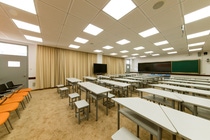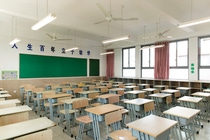Media
BASF donates lighting solution to improve classroom learning environment
- Renovation project at a Shanghai primary school improves lighting for more than 1,000 children
- BASF Sunvue® lighting reduces blue light by up to 75 percent: higher color rendering index makes indoor lighting closer to that of natural sunlight
Shanghai, China – March 18, 2019 – A solution from BASF is helping to improve the learning environment for children at a Shanghai primary school, through better lighting that mimics natural sunlight. In the “Sunshine Lighting Project”, Sunvue® LED lighting tubes and panels, donated by BASF, have replaced fluorescent lighting tubes in classrooms and function rooms at the Gaohang Campus of Pudong Gaoqiao Town Primary School.
Cao Peide, Principal of the Gaoqiao Town Primary School, said, “We are very grateful for BASF’s generous donation and fully support on the renovation. Light is an important ingredient in educational settings. The Sunshine lighting project has enabled a healthier and more comfortable learning environment for our students, offering warmer, brighter and more natural lighting in the classrooms.”
A preliminary test after installation showed that the average illuminance measured at multiple locations inside one of the classrooms increased by approximately 50%. The color rendering index, an important indicator of the quality of artificial light source, has increased from the original 78 to above 95 – close to true sunlight.
Sunvue is the result of six years of research and development by BASF, and is based on BASF’s patented organic color conversion material. Sunvue technology enables a portion of the LED blue light to be absorbed and converted into yellow-green and red light, a more complete spectrum which is closer to that of natural sunlight. Compared with the conventional WLED lights on the market, the BASF technology can reduce the amount of blue light by up to 75 percent, depending on the color temperature.
Chris Cheng, Head of Sales and Marketing, Sunvue Lighting, Electronic Materials, BASF said, “Our target is to use the right technologies that we now have access to, in order to contribute to the overall eye health of students and other community members. Sunvue provides a comfortable light source that not only faithfully renders the colors of various objects as if under sunlight, but also provides a more comfortable and uniform illumination.”
The Sunshine Lighting Project also helps the school save resources. Sunvue lighting tubes are significantly more energy efficient and durable than fluorescent tubes, technically able to provide lighting for up to 20,000 hours, or about 6 hours every day for ten consecutive years.
Sunvue was first launched as BASF’s own brand in Taiwan, China, in early 2018. Its products include LED bulbs, tubes and desk lamp. From November 2018, Sunvue products have been available in Mainland China through e-commerce platforms such as JD and TMall.
About BASF in Greater China
BASF has been a committed partner to Greater China since 1885. With larger production sites in Shanghai, Nanjing and Chongqing, BASF is a major foreign investor in the country’s chemical industry, and operates the Innovation Campus Shanghai, a global and regional research and development hub. BASF posted sales of over €7.3 billion in 2018 to customers in Greater China, and employed 9,317 people as of the end of that year. For further information, please visit www.basf.com/cn/en.
About BASF
At BASF, we create chemistry for a sustainable future. We combine economic success with environmental protection and social responsibility. The more than 122,000 employees in the BASF Group work on contributing to the success of our customers in nearly all sectors and almost every country in the world. Our portfolio is organized into six segments: Chemicals, Materials, Industrial Solutions, Surface Technologies, Nutrition & Care and Agricultural Solutions. BASF generated sales of around €63 billion in 2018. BASF shares are traded on the stock exchanges in Frankfurt (BAS), London (BFA) and Zurich (BAS). Further information at www.basf.com.


